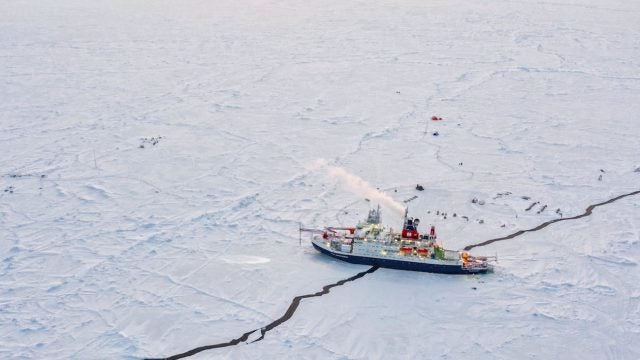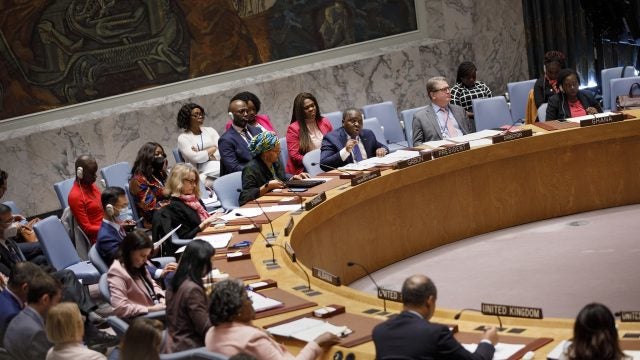
Title: Principles or Pragmatism? How to React to West Africa’s Slew of Coups
West Africa has experienced six coup attempts over the past two years, four of which saw the military successfully ousting presidents in Mali (twice), Guinea, and Burkina Faso. Though unconstitutional, those power grabs garnered significant popular support, embodying the failure of democratically–elected governments in that part of the world. In a region where Islamist militancy is gaining ground, international partners may have to overcome their reluctance to engage with military leaders.
It has become an all too familiar scenario in West Africa: men in military fatigues appear on national television to solemnly announce that the president has been deposed and the army has taken power to better serve the people. Over the past two years, this happened twice in Mali, then in Guinea and in Burkina Faso: three countries now ruled by a young generation of military leaders. And, although they were thwarted, coup attempts in Niger in March 2021 and Guinea-Bissau in February 2022 indicate that the military is once again carving out a political role for itself in the region.
The inability of elected governments to build solid institutions and implement a form of inclusive governance that improves the lives of ordinary people, as well as a broader disenchantment with democracy, are underpinning these coups which occurred against a backdrop of growing jihadist violence in West Africa’s Sahel region. Military thirst for power also appears undiminished on a continent that has experienced more than eighty successful coups since 1952, and where men in uniform have often played an outsized political role. Bewildered regional and international actors that have invested in the region’s stability, meanwhile, wonder how to respond to these unconstitutional changes of power and prevent other dominoes from falling.
The answers, as so often, are nuanced.
The immediate triggers for the coups were country-specific. The state’s inability to protect the population from violent attacks by jihadists and other armed groups featured high on the list of grievances behind Mali’s August 2020 coup and Burkina Faso’s January 2022 coup, but it did not play a role in Guinea, a country with no jihadist presence. Crucial factors behind Guinea’s September 2021 coup were the flagrant and repeated human rights violations against political opposition and civil society representatives by then-president Alpha Condé. In Burkina Faso, however, deposed President Roch Marc Christian Kaboré had a relatively normalized relationship with his country’s opposition. Mali’s May 2021 coup, meanwhile, was more of a palace revolution, during which Colonel Assimi Goïta, then vice president, forced out the transitional government’s civilian leadership when the latter tried to replace military officials loyal to the junta. Goïta assumed the presidency soon after.
But when looking beyond these differences, clear patterns and similarities become visible. In all three countries, for starters, the putschists enjoyed significant popular support. In capitals and major cities, thousands of demonstrators—mostly urban youth—expressed support for the power grabs. In contrast, no one came out in support of the democratically-elected presidents.
Governance crises, corruption, and, more widely, the state’s inability to respond to the aspirations of ordinary people go some way to explain widespread popular support for these coups. In Guinea, the elite’s dubious management of mining revenues was a source of friction and a controversial constitutional change extending octogenarian Alpha Condé’s time in office made matters worse. In Mali, youth held mass protests against widespread embezzlement of state funds under Ibrahim Boubacar Keïta’s rule. Flawed parliamentary elections in Mali in 2020 also pushed people to the streets. In Burkina Faso, the corruption of the army’s old guard has strongly discredited the elected president and government.
Another reason is the relatively young age of the three military leaders who replaced the ousted presidents. Ironically, all three are a product of Western investment in West Africa’s security architecture. Mali’s Assimi Goïta is 39, while Burkina Faso’s Paul-Henri Sandaogo Damiba and Guinea’s Mamadi Doumbouya are 41. In West Africa, where the average age of the population is around 20 years, many people identify more easily with these new leaders, who claim to offer a more hands-on form of governance than their technocratic predecessors.
This new generation of young military leaders has wooed disenfranchised youth with the same populist leftist rhetoric West African military leaders used in the 1970s and 1980s. After seizing power in Guinea, Dombouya quoted Ghana’s charismatic coup leader Jerry John Rawlings (who served as president from 1981 to 2001): “If the people are crushed by their elites, it is up to the army to give the people their freedom.” In Burkina Faso, President Damiba says he wants to bring back values such as integrity and sobriety, first promoted in the 1980s by self-styled Marxist revolutionary leader Thomas Sankara, who has become a national hero since his violent death in 1987. Damiba tellingly concluded his first televised speech with Sankara’s slogan “Fatherland or death, we shall overcome.” In Mali, the junta is advocating for an end to the country’s reliance on former colonial ruler France, a stance reminiscent of Laurent Gbagbo’s, Ivory Coast’s former president and historical figure of the leftist opposition in francophone Africa.
While these new men may be dusting off old ideas, their popularity is understandable. The revolutionary ideas of the 1980s were never, or at least not fully, given a chance by the West African leaders of the 1990s and 2000s. True free speech largely prevailed after the introduction of multi-party elections, but neither the media nor these elections gave people much influence over government policy. Moreover, rampant corruption was tolerated or even encouraged, while francophone West African countries were never truly able to establish an equal relationship with their former colonizer. As for opposition parties, they haven’t been able to offer alternative models of society or strong political figures attractive to young people. In short, many West Africans feel that democracy has failed to live up to its promises. Against this backdrop, it is hardly surprising that the population has rallied behind those they see as representing a possible break from corrupt, inept, and aging regimes.
The governments of Mali and Burkina Faso have now outlined their transitional paths. The Malian junta, backtracking on previous plans to hold elections this year, has proposed staying in power for up to 5 years, while Burkina Faso envisages a thirty-six-month transition. Guinea has yet to present a clear timeline. All these countries are likely to see violent shake-ups in the army, or possibly counter-coups, with accompanying protests and unrest, before any return to civilian rule.
International and regional actors, meanwhile, are watching closely as they try to come to terms with the reality of their reduced influence and leverage on the new military regimes. Faced with unconstitutional regime changes that contravene international agreements, regional partners like The Economic Community of West African States (ECOWAS), as well as international ones, including France, the United States, and the European Union, are now torn between principles and pragmatism.
ECOWAS’s swift condemnation of the coups and subsequent sanctions, in Mali’s case, showed that the fifteen-member bloc is determined to uphold the principle of democracy in the region. But its harsh economic sanctions on Mali have so far proved ineffective in forcing the junta to compromise, and it has proven reluctant to impose similar sanctions on Burkina Faso and Guinea over concerns that they might drive a wedge between ECOWAS and an additional two member states, as was the case in Mali.
After France rightly condemned Mali’s coup in strong terms, ties between Bamako and Paris hit rock bottom. France announced on February 16 that it would withdraw its counter-terrorism force from Mali and continue the anti-jihadist fight from elsewhere in the region, potentially driving Mali further into Russia’s arms.
International actors should learn from France’s reality check in Mali, starting with Burkina Faso. While military coups are by no means acceptable or a long-term solution for a country’s problems, international actors should avoid adopting stances which may be seen as so uncompromising that they sour all diplomatic ties. Of course, engaging constructively to ensure that the transition ultimately leads to stability in Burkina Faso is no small challenge. But the alternative is to risk isolating a country that is facing an unprecedented humanitarian crisis and increasing pressure from jihadist insurgencies, all the while yielding space to alternative partners such as Russia.
The strategy chosen by the United States in Burkina Faso is a good example of the dilemma. It took nearly three weeks before the U.S. decided that the January 24 ouster of President Kaboré constituted a coup. Until February 18, the U.S. State Department paused most of its assistance to Burkina Faso, in line with a law stipulating that it must halt foreign aid to a country whose elected head of government has been ousted by the military. Though the U.S. froze nearly $160 million in aid, it used provisions in the law that allowed it to make an exception for essential humanitarian goods, including medicine. This kind of pragmatism could prove hugely important for the country, which is struggling to provide relief to 1.8 million displaced people.
The contexts are undoubtedly different in Mali and Guinea where the new military regimes are reluctant to cooperate with international partners. Bamako has opted to break with Paris, while Conakry remains deliberately vague about its intentions, despite pressure from the international community.
In these two countries, France, the EU, the United States, and ECOWAS should maintain strong pressure to impress on the putschists that they do not have free rein to determine the modalities of the transition alone. Nonetheless, those outside actors must simultaneously prevent a total rupture of diplomatic ties, by avoiding or alleviating, for example, economic sanctions that disproportionately harm the population and in turn reinforce popular support for the military leadership. Maintaining military training programs might seem unpalatable when generals have seized power. But they are often the best channels of contact between countries providing the training and the ruling military hierarchy.
Ultimately, measures will have to be taken to avoid creating situations where the military or the population perceive coups as a viable option. In the Guinean example mentioned earlier, President Condé changed the constitution to run for a third term. This should be seen as an opportunity for regional institutions and international partners to reiterate their support for constitutional order and protocols against authoritarian regimes and constitutional or electoral meddling, which allows leaders to stay in power at all costs.
…
Rinaldo Depagne is the International Crisis Group’s Africa Program Deputy Director and West Africa Project Director. Before joining Crisis Group in 2008, he worked as a journalist, mostly in West Africa, including for the BBC and Canal+.
Image Credit: Aboubacarkhoraa, CC BY-SA 4.0
More News

This article explores the uncertain future of Arctic governance amid shifting global geopolitics. It argues that whether Washington and Moscow opt for confrontation or cooperation, multilateralism in the Arctic…

Twenty-five years ago, the United Nations Security Council adopted Resolution 1325, establishing a framework that underpins the Women, Peace, and Security (WPS) Agenda. The Resolution recognized both the…

When we analyze conflicts in the Middle East, we are not analyzing conflicts with isolated impacts but risks for global energy security. Recent conflicts in the Middle East have highlighted…